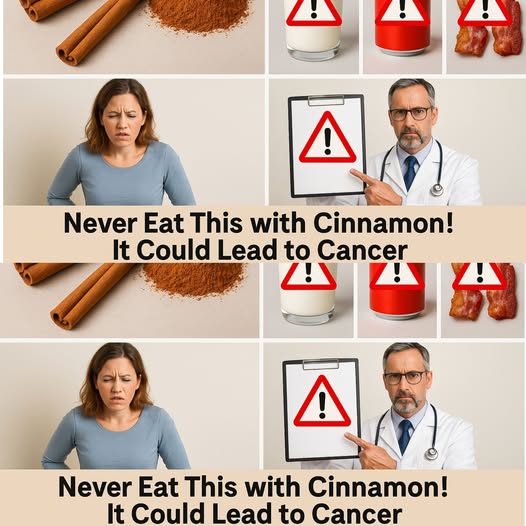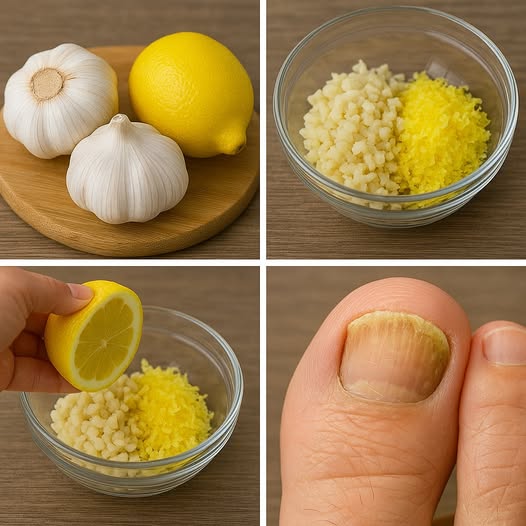Introduction: The Frightening Truth Behind Cinnamon’s Hidden Dangers

Cinnamon has long been praised as a super spice—aromatic, flavorful, and loaded with health benefits. It regulates blood sugar, reduces inflammation, and even aids in weight loss. But what if we told you that pairing cinnamon with certain common foods could actually increase your risk of cancer?
Yes, you read that right.
While cinnamon itself boasts powerful antioxidants, some food combinations can trigger chemical reactions that negate its benefits—and may even lead to the formation of carcinogens. In this blog post, we’ll explore three shocking food pairings with cinnamon that you should avoid at all costs.
We’ll break down the science, bust myths, and answer frequently asked questions. If you care about your health—or the health of your loved ones—this article is a must-read.
Why Cinnamon Can Be a Double-Edged Sword
Before we dive into the dangerous combos, let’s get one thing straight: cinnamon is not the enemy. The danger lies in how and what it’s mixed with. When combined with certain foods, cinnamon’s chemical compounds—especially coumarin, which can be toxic in high doses—may become more reactive and harmful.
Here’s what you need to know:
- Coumarin, found in Cassia cinnamon, is linked to liver damage and potential carcinogenic effects.
- Some food pairings can accelerate the conversion of naturally occurring substances into harmful byproducts in the body.
- The problem intensifies when these foods are consumed frequently or in large quantities.
3 Worst Food Pairings With Cinnamon That May Increase Cancer Risk
1. 🧁 Cinnamon + Processed Sugar: A Toxic Dessert Trap
The Combo: Cinnamon sprinkled on sugary baked goods like donuts, cinnamon rolls, and sugary cereals.
The Danger: This is the most common and most dangerous cinnamon combo. Processed sugar spikes insulin levels and promotes chronic inflammation—a well-known precursor to many cancers.
When cinnamon is added to sugary treats, the body may experience an inflammatory overload. What’s worse, sugar accelerates the absorption of coumarin, making it more bioavailable and potentially more harmful.
⚠️ Why It’s Risky:
- High-glycemic foods + cinnamon = higher coumarin activity
- Chronic inflammation is linked to 13 types of cancer, including breast, colon, and pancreatic cancer.
- Refined sugar suppresses immune function, making the body more vulnerable.
Stat: The American Institute for Cancer Research has identified excess sugar consumption as a key risk factor for metabolic syndrome, which increases cancer risk by over 30%.
2. 🍸 Cinnamon + Alcohol: The Dangerous Holiday Mix
The Combo: Cinnamon-spiced cocktails, mulled wine, or cinnamon whiskey.
The Danger: Alcohol is a Group 1 carcinogen, according to the World Health Organization. Adding cinnamon into the mix might enhance flavor—but it also amplifies liver stress. Since coumarin in cinnamon is already hepatotoxic, combining it with alcohol is like adding fuel to the fire.
Your liver becomes the battleground. While it’s busy processing the alcohol, it’s also trying to metabolize the coumarin, leading to oxidative stress and possible liver cell damage.
⚠️ Why It’s Risky:
- Alcohol reduces the liver’s ability to detoxify harmful substances.
- Cinnamon’s coumarin competes for liver enzymes, making the combo doubly harmful.
- This combination can promote DNA mutations, the earliest trigger for cancerous cell development.
Fact: A 2023 meta-analysis found that alcohol consumption combined with dietary toxins triples the risk of liver cancer.
3. 🥫 Cinnamon + Canned or Processed Meats: The Silent Killer Combo
The Combo: Cinnamon used in meat rubs or spice blends for sausages, canned meats, or processed bacon.
The Danger: Many people use cinnamon in meat marinades for its unique aroma. However, pairing it with processed meats loaded with nitrates and preservatives can be a fatal mistake.
When cinnamon interacts with nitrites (found in preserved meats), there’s potential for the formation of nitrosamines—potent carcinogens.
⚠️ Why It’s Risky:
- Nitrosamines are directly linked to gastric and colorectal cancers.
- Heating this combination (e.g., grilling or roasting) makes things worse by forming advanced glycation end-products (AGEs).
- These toxins accumulate in body tissues over time and contribute to oxidative stress.
Warning: The WHO classifies processed meats as carcinogenic to humans, stating regular consumption increases colorectal cancer risk by 18% per 50g serving.
Frequently Asked Questions: Cinnamon + Health Risks
1. Isn’t Cinnamon supposed to be healthy?
Absolutely. Cinnamon—especially Ceylon cinnamon, which has lower coumarin levels—is packed with antioxidants. But like any health food, context matters. It must be consumed correctly and in moderation.
2. Is all cinnamon dangerous?
No. There are two main types:
- Cassia Cinnamon: Contains high levels of coumarin; widely available and cheaper.
- Ceylon Cinnamon: Known as “true” cinnamon; lower in coumarin and safer for regular use.
Pro Tip: Always check your cinnamon’s origin. Look for organic Ceylon cinnamon to reduce toxicity.
3. How much cinnamon is safe to consume daily?
Experts recommend no more than 1 teaspoon per day of Cassia cinnamon. For Ceylon, you can safely consume up to 1–1.5 teaspoons daily, depending on your health condition and age.
4. Can I still enjoy cinnamon in desserts or drinks?
Yes—but use it wisely:
- Opt for natural sweeteners like honey or dates instead of white sugar.
- Avoid mixing it with alcohol or nitrates.
- Use Ceylon cinnamon in moderation.
5. How do I know if I’ve consumed too much coumarin?
Early signs of coumarin toxicity include:
- Headaches
- Dizziness
- Nausea
- Liver tenderness
- Yellowing of the skin or eyes (in severe cases)
If you experience these symptoms and are a heavy cinnamon user, consult your doctor.
Smart Alternatives and Safe Pairings
Here’s how to still enjoy cinnamon without the cancer risk:
| Safe Pairing | Why It Works |
|---|---|
| Cinnamon + Oatmeal (unsweetened) | Stabilizes blood sugar without inflammatory spikes |
| Cinnamon + Apple | Natural fruit sugars paired with fiber buffer the impact |
| Cinnamon + Herbal Tea | Enhances digestion and detoxification |
| Cinnamon + Sweet Potatoes | Rich in beta-carotene and low in nitrates |
| Cinnamon + Quinoa | Protein-packed and promotes sustained energy |
Bonus Tip: Sprinkle cinnamon on plain Greek yogurt with a few walnuts for a safe, anti-inflammatory snack.
Conclusion: Rethink Your Cinnamon Combos—Your Health Depends on It
Cinnamon is a powerful spice—but it’s not without its risks. While many of us innocently pair it with sugary treats or festive cocktails, these combinations can backfire in frightening ways.
From processed sugars and meats to alcohol, the wrong cinnamon combo can quietly increase your cancer risk over time. But by understanding the science and making smarter choices, you can continue to enjoy cinnamon safely and reap its amazing health benefits.
🛑 Take action today:
- Switch to Ceylon cinnamon
- Eliminate dangerous food pairings
- Share this article to warn friends and family
Your health is too precious to gamble on flavor alone. Let cinnamon be your ally—not your enemy.

